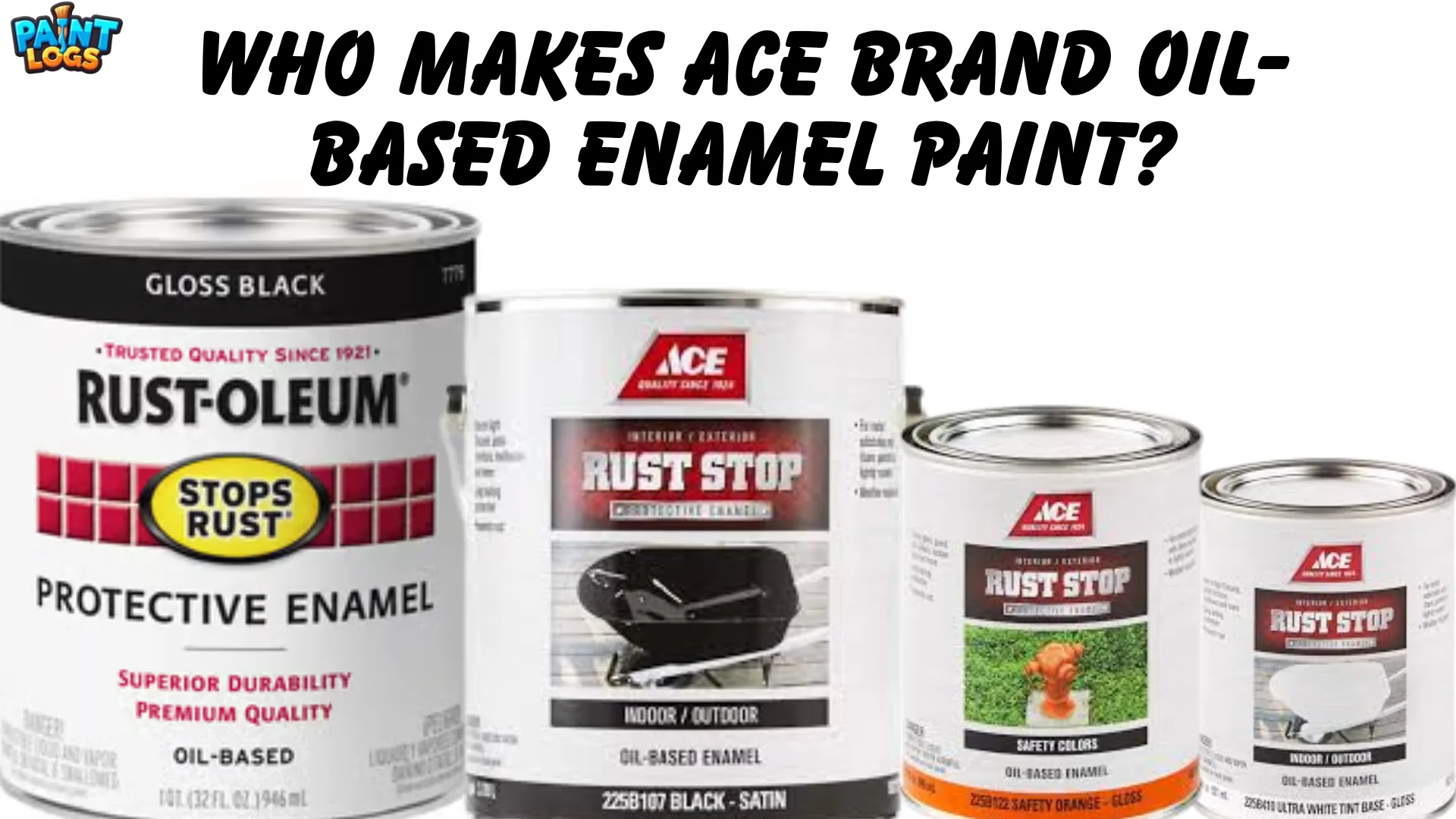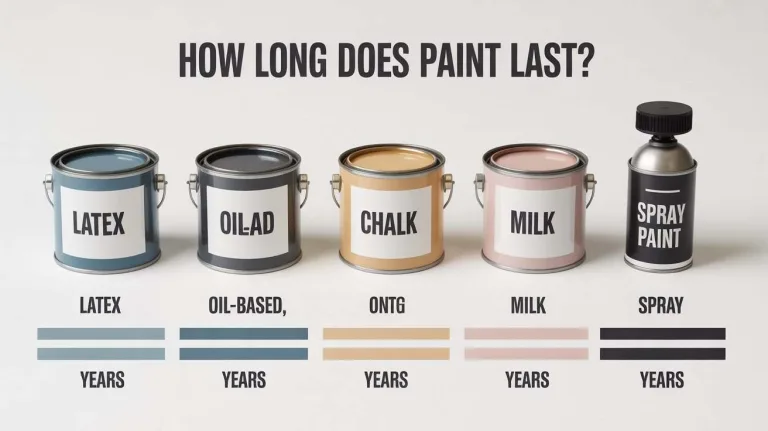If you’ve ever shopped for paint at Ace Hardware, you’ve probably come across Ace Oil-Based Enamel or the well-known Ace Rust Stop line. These paints are popular among both DIYers and professionals due to their durability, glossy finish, and rust-inhibiting properties. But here’s a question many homeowners and contractors ask: Who actually makes Ace brand oil-based enamel paint?
The answer isn’t as straightforward as you might think. Ace doesn’t manufacture the paint themselves—they partner with well-known paint makers like Valspar to produce their private-label lines.
In this guide, we’ll break down exactly who makes Ace brand paints, what sets oil-based enamel apart from water-based enamel, how Ace Rust Stop compares to other brands, and even cover related FAQs about thinning, motor oil, and spray paint.
By the end, you’ll know not only who makes Ace paint but also whether oil-based enamel is the right choice for your next project.
Who Makes Ace Brand Oil-Based Enamel Paint?
Many shoppers assume that Ace Hardware manufactures its own paints. In reality, Ace owns the trademarks and branding, but the actual paint production is handled by larger paint companies.
Today, Valspar is the exclusive manufacturer of Ace’s paint lines, including its oil-based enamel and the popular Ace Rust Stop products. Valspar, a global paint leader (now part of Sherwin-Williams), has been making Ace-branded paints since 2018. This partnership ensures that Ace can offer paints with professional-grade performance while keeping its own recognizable labels.
It’s important to note that Ace Hardware has shifted paint partners over the years. In earlier decades, different suppliers were involved in producing Ace’s paints. However, Valspar is the most recent and widely confirmed manufacturer.
So, if you’re buying a can of Ace Oil-Based Enamel or Rust Stop, you’re essentially getting a Valspar-made product sold under the Ace name.
Valspar & Ace: The Manufacturing Partnership
In 2018, Ace Hardware announced that Valspar would exclusively manufacture its paints. This was a strategic move to strengthen Ace’s paint department and give customers a competitive alternative to big-box store brands.
Here’s what that means for shoppers:
- Ace keeps the branding. Product lines like Ace Paint, Royal, Clark+Kensington, and Rust Stop remain Ace-owned trademarks.
- Valspar makes the paint. From the base formulations to the tint systems, Valspar handles the actual production.
- Quality assurance. Valspar’s expertise ensures Ace can offer high-performance paints (durability, coverage, and color consistency) that match or exceed other national brands.
- Specialty paints. This includes not just regular house paints, but also oil-based enamels, spray paints, and rust-preventive coatings.
For Ace customers, this means you’re buying a paint that’s professionally manufactured but priced and branded under Ace’s own label. That’s why many pros consider Ace paints a “hidden gem” in the paint aisle.
What Is Oil-Based (Alkyd) Enamel Paint?
When you see a can labeled oil-based enamel, it usually means you’re looking at an alkyd paint. Alkyd enamel uses synthetic resins (derived from oils) as its binder, which gives the paint its signature hard, glossy, and durable finish.
Here’s what makes oil-based enamel unique:
- Durability: It forms a tough shell that resists scratches, stains, and wear better than most water-based paints.
- Finish: Oil-based enamels have a smooth, glossy appearance that looks especially good on trim, doors, cabinets, and metal surfaces.
- Slow drying time: Unlike acrylics, they dry much slower, which allows the paint to level out and reduce brush marks—but it also means longer wait times between coats.
- Odor & cleanup: They have a stronger smell and require solvents (like mineral spirits) for thinning and cleanup.
👉 Is alkyd enamel oil-based?
Yes. Alkyd enamel is considered oil-based because it uses oil-derived resins. However, it’s technically not the same as traditional “linseed oil paints.” Think of it as the modern, synthetic version of oil-based paint.
👉 Is enamel paint always oil-based?
Not anymore. The word enamel originally referred to the hard, glossy finish of oil paints, but today many water-based paints are also sold as “enamels” because they mimic that durable sheen. Always check the label: if it says alkyd or oil-based, then it’s a true oil enamel. If it says acrylic enamel, that means it’s water-based.
So when you buy Ace Rust Stop Oil-Based Enamel, you’re dealing with a true alkyd enamel—not an acrylic.
Oil-Based vs. Water-Based Enamel Paint: Key Differences
Choosing between oil-based and water-based enamel can be tricky, especially since both are labeled “enamel.” Here’s how they compare:
1. Drying Time
- Oil-based enamel: Takes 8–24 hours to dry between coats.(See our full guide on how long to wait between coats of paint for more tips.)
- Water-based enamel: Dries in 1–2 hours, sometimes less.
2. Durability & Hardness
- Oil-based: Extremely durable, ideal for high-traffic areas, trim, and metal.
- Water-based: Good durability but softer, may chip more easily on heavy-use surfaces.
3. Finish Quality
- Oil-based: Levels out smoothly, leaving fewer brush marks and a glossy, glass-like surface.
- Water-based: Can dry too quickly, making brush strokes more visible.
4. Yellowing Over Time
- Oil-based: Can yellow in areas without sunlight (like trim or cabinets).
- Water-based: Stays white and resists yellowing.
5. Odor & Cleanup
- Oil-based: Strong odor, requires mineral spirits or turpentine for cleanup.
- Water-based: Low odor, cleans up easily with soap and water.
👉 Quick Rule of Thumb:
- Use oil-based enamel when you need maximum durability (metal doors, rust-prone surfaces, trim).
- Use water-based enamel for convenience and low odor (interior walls, furniture, quick projects).
And if you’re wondering about solvents: mineral spirits are usually recommended for thinning oil-based enamels. Acetone can sometimes work, but it’s often too harsh unless the manufacturer specifies it on the SDS sheet.
Can You Thin Oil-Based Enamel with Acetone?
One of the most common questions painters ask is whether they can use acetone to thin oil-based enamel paint. The short answer: sometimes, but it’s not the best choice.
Here’s why:
- Manufacturer recommendations matter: Most oil-based enamels, including Ace Rust Stop, recommend mineral spirits or paint thinner as the go-to solvent. These thin the paint evenly without breaking down the resin structure.
- Acetone works differently: Acetone is a very strong, fast-evaporating solvent. It can thin paint, but it tends to dry the mixture too quickly, which can cause uneven flow, clumping, or even damage to the finish.
- When it’s safe to use: Some enamel formulations list acetone as an acceptable thinner (this can be confirmed on the product’s SDS — Safety Data Sheet). If acetone is listed, it’s safe to use in small amounts.
👉 Best practice:
- Always check the Ace Rust Stop Oil-Based Enamel SDS for approved thinners.
- If in doubt, stick with mineral spirits or turpentine for better control and a smoother finish.
Ace Rust-Stop Oil-Based Enamel: Features & Applications
Ace’s Rust Stop Oil-Based Enamel is one of the most popular specialty paints in their lineup. Manufactured by Valspar and sold under the Ace brand, this paint is specifically designed to protect metal from rust and corrosion while delivering a durable, glossy finish.
Key Features:
- Alkyd-based formula: True oil enamel for maximum hardness and protection.
- Rust prevention: Blocks moisture and oxygen to stop rust from forming on bare or lightly rusted metal.
- Interior & exterior use: Works on fences, railings, outdoor furniture, automotive parts, and indoor metal projects.
- Finish options: Gloss, satin, or flat finishes, available in neutral and tintable bases.
- Durability: Withstands harsh weather, UV rays, and everyday wear.
Applications:
- Ideal for bare metal surfaces that need long-term rust protection.
- Perfect for touch-ups on existing painted metal (after proper prep).
- Commonly used for wrought iron fences, garage doors, outdoor furniture, trailers, farm equipment, and tools.
👉 Many painters compare Ace Rust Stop to Rust-Oleum. While both are alkyd enamels, Ace’s formula is often noted for leveling out smoother and holding up well outdoors.
Is Acrylic an Oil-Based Paint?
This is a question that often confuses beginners: is acrylic an oil-based paint? The answer is no.
- Acrylic paint is water-based, meaning it uses water as the solvent instead of oils.
- It dries quickly, has very little odor, and cleans up easily with soap and water.
- Acrylics form a flexible plastic-like film once dry, which makes them versatile for walls, furniture, crafts, and canvas art.
How it differs from oil-based enamel:
- Oil-based enamels (like Ace Rust Stop) are harder and more durable, but they require mineral spirits for cleanup and emit strong fumes.
- Acrylics are easier to work with indoors, but don’t provide the same long-term rust or weather protection on metal. If you’re wondering how acrylics hold up against moisture, check out our full guide on is acrylic paint waterproof ?
👉 Tip: If you’re looking for a durable, glossy finish on metal or trim, stick with oil-based enamel. For quick-drying projects on wood, canvas, or walls, acrylics are a better option.
What Other Paint Brands Does Ace Sell?
Ace Hardware isn’t limited to just its own house paints. While Ace brand paints (manufactured by Valspar) cover a wide range of needs, the store also stocks several other trusted names.
Paint brands you’ll find at Ace Hardware include:
- Clark+Kensington – A premium Ace-exclusive line that combines paint and primer in one.
- Royal Paint – A more affordable Ace line, known for solid coverage and everyday use.
- Valspar – Since the manufacturing partnership, Valspar paints are directly available in some Ace locations.
- Benjamin Moore – In select Ace stores, you’ll also find this professional-grade brand.
👉 In short, Ace offers a mix of exclusive in-house brands and big-name paints so customers can choose based on budget and performance needs.
So whether you need oil-based enamel, rust-preventive coatings, or interior wall paint, Ace gives you multiple brand options under one roof.
Beyond Paint: Who Makes Ace Brand Motor Oil?
Ace isn’t just about paint — the brand also sells a range of automotive products, including Ace brand motor oil. But just like their paints, Ace doesn’t manufacture the oil themselves.
Instead, Ace partners with Olympic Oil, a long-standing lubricant manufacturer based in the U.S., to produce its private-label motor oils. Olympic Oil packages the oil under the Ace Hardware brand, ensuring customers get a reliable product that meets industry standards while carrying the familiar Ace name.
Key points about Ace brand motor oil:
- Made by Olympic Oil – a respected supplier for private-label oils sold in hardware and retail stores.
- Available types: 10W-30, 5W-30, and other common automotive grades.
- Positioned as value-friendly: Offers performance similar to national oil brands but at a lower price.
👉 Related queries like “who makes Walmart brand oil” (Warren Distribution) and “who makes Costco brand oil” (also Warren Distribution) show that private-label manufacturing is common in the oil industry, just as it is in the paint industry.
So, if you’re buying Ace brand oil or motor oil, you’re actually getting a product manufactured by Olympic Oil, bottled and branded for Ace.
Mixing and Using Oil-Based Enamel Paint: Practical Tips
Now that we know who makes Ace oil-based enamel paint, let’s quickly look at how to get the best results when using it. Oil-based paints behave differently than acrylics, so a little preparation goes a long way.
1. Stir, Don’t Shake
Always stir your enamel thoroughly before use. Shaking can create bubbles that ruin the finish.
2. Choose the Right Thinner
Stick with mineral spirits or paint thinner unless the SDS sheet lists acetone as safe. Using the right thinner ensures smooth application and proper curing.
3. Apply in Thin, Even Coats
Oil-based enamels flow better in thin layers. A heavy coat may look glossy at first but can sag or take forever to dry.
4. Watch Drying Times
Be patient. Oil-based enamels like Ace Rust Stop may need 8–24 hours between coats depending on temperature and humidity. Rushing can cause wrinkling or peeling.
5. Prep Metal Surfaces Well
For best rust prevention, sand away loose rust and clean the surface thoroughly before painting. Apply primer if needed, then finish with Ace Rust Stop for a protective, glossy coat.
Conclusion: Who Really Makes Ace Brand Oil-Based Enamel Paint?
So, who makes Ace brand oil-based enamel paint? The answer is: Valspar. Since 2018, Valspar (part of Sherwin-Williams) has been the exclusive manufacturer behind Ace’s paint lines, including Ace Oil-Based Enamel and the Ace Rust Stop rust-preventive coatings.
Meanwhile, Ace retains ownership of its trademarks, meaning products like Clark+Kensington, Royal, and Rust Stop still carry the Ace name—just with professional-grade manufacturing behind them. And when it comes to motor oil, Ace relies on Olympic Oil as its producer.
In short:
- Ace owns the brand.
- Valspar makes the paint.
- Olympic Oil makes the motor oil.
For shoppers, this means you’re getting reliable, name-brand quality at Ace’s private-label price. Whether you’re protecting a rusty fence with Rust Stop Oil-Based Enamel or painting trim with Clark+Kensington, you can trust the paint to perform as well as national brands.
👉 Next time you walk into an Ace Hardware, you’ll know the story behind the can—and why Ace paints have earned their reputation as a solid choice for DIYers and pros alike.
FAQs
Who makes Ace brand oil-based enamel paint?
Ace Hardware doesn’t manufacture its own paints. Its oil-based enamel paints, including the Ace Rust Stop line, are manufactured by Valspar, a Sherwin-Williams brand.
Who makes Ace Rust Stop paint?
Valspar produces the Ace Rust Stop oil-based enamel line. These are specialty paints designed to protect metal from rust and corrosion.
What is oil-based enamel paint?
Oil-based enamel (often alkyd enamel) is a durable paint that dries to a hard, glossy finish. It’s commonly used on trim, doors, and metal surfaces because it resists wear and rust better than water-based paints.
Is alkyd enamel oil-based?
Yes. Alkyd enamel is considered an oil-based paint because it uses oil-derived synthetic resins as binders.
Is enamel paint always oil-based?
No. While enamel originally meant oil-based glossy paint, today many water-based acrylics are also labeled “enamel” because they have a hard, glossy finish. Always check the label.
Can I use acetone to thin oil-based enamel paint?
Not usually. Most manufacturers recommend mineral spirits or paint thinner. Acetone evaporates too quickly and can cause problems unless it’s specifically listed on the product’s SDS (Safety Data Sheet).
Does Ace Hardware sell oil-based paint?
Yes. Ace carries several oil-based paints, including Ace Rust Stop Oil-Based Enamel for rust prevention, as well as other interior/exterior options.
What paint brands are sold at Ace Hardware?
Ace sells a mix of in-house and national brands: Clark+Kensington, Royal, Ace Paint, Rust Stop, Valspar, and in some locations Benjamin Moore.
Who makes Ace brand motor oil?
Ace brand motor oils are manufactured by Olympic Oil, a U.S.-based supplier of private-label automotive lubricants.
Is acrylic paint oil-based?
No. Acrylic is a water-based paint, not oil-based. It dries quickly, has a softer finish compared to oil enamel, and cleans up with soap and water.






